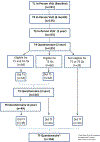Fatigue after breast cancer treatment: Biobehavioral predictors of fatigue trajectories
- PMID: 30321021
- PMCID: PMC6372460
- DOI: 10.1037/hea0000652
Fatigue after breast cancer treatment: Biobehavioral predictors of fatigue trajectories
Abstract
Objective: Fatigue is a common side effect of cancer treatment, but there is considerable variability in fatigue severity and persistence among survivors. This study aimed to characterize longitudinal trajectories of fatigue after breast cancer treatment and to identify predictors of varying fatigue trajectories.
Methods: Women (N = 191) from the Mind-Body Study completed assessments after primary treatment for early stage breast cancer and at regular follow-ups that occurred up to 6 years after treatment (M = 4.3 years). Growth mixture models were used to characterize fatigue trajectories, and demographic, medical, and biobehavioral risk factors were examined as predictors of trajectory group.
Results: Five trajectories were identified, characterized as High, Recovery, Late, Low, and Very Low fatigue. The High and Recovery groups (40% of sample) evidenced elevated fatigue at posttreatment that declined in Recovery but persisted in the High group. In bivariate analyses, trajectory groups differed significantly on depressive symptoms, sleep disturbance, childhood adversity, body mass index, and the inflammatory marker soluble TNF receptor type II, which were higher in the High and/or Recovery groups. In multivariate models, depressive symptoms and childhood adversity distinguished High and Recovery from other groups. Rates of chemotherapy were higher in the Recovery than in the High or Late group, whereas rates of endocrine therapy were higher in the High than in the Recovery group.
Conclusions: There are distinct longitudinal trajectories of fatigue after breast cancer treatment. Psychological factors are strongly associated with adverse fatigue trajectories, and together with treatment exposures may increase risk for cancer-related fatigue. (PsycINFO Database Record (c) 2018 APA, all rights reserved).
Figures


Similar articles
-
Do all patients with cancer experience fatigue? A longitudinal study of fatigue trajectories in women with breast cancer.Cancer. 2021 Apr 15;127(8):1334-1344. doi: 10.1002/cncr.33327. Epub 2021 Feb 19. Cancer. 2021. PMID: 33606273 Free PMC article.
-
Predictors and Trajectories of Morning Fatigue Are Distinct From Evening Fatigue.J Pain Symptom Manage. 2015 Aug;50(2):176-89. doi: 10.1016/j.jpainsymman.2015.02.016. Epub 2015 Mar 28. J Pain Symptom Manage. 2015. PMID: 25828559 Free PMC article.
-
Testing a biobehavioral model of fatigue before adjuvant therapy in women with breast cancer.Cancer. 2019 Feb 15;125(4):633-641. doi: 10.1002/cncr.31827. Epub 2018 Dec 18. Cancer. 2019. PMID: 30561795 Free PMC article.
-
Inflammation and behavioral symptoms after breast cancer treatment: do fatigue, depression, and sleep disturbance share a common underlying mechanism?J Clin Oncol. 2011 Sep 10;29(26):3517-22. doi: 10.1200/JCO.2011.36.1154. Epub 2011 Aug 8. J Clin Oncol. 2011. PMID: 21825266 Free PMC article.
-
Behavioral Symptoms after Breast Cancer Treatment: A Biobehavioral Approach.J Pers Med. 2015 Aug 3;5(3):280-95. doi: 10.3390/jpm5030280. J Pers Med. 2015. PMID: 26247972 Free PMC article. Review.
Cited by
-
Development and Validation of a Predictive Model of Severe Fatigue After Breast Cancer Diagnosis: Toward a Personalized Framework in Survivorship Care.J Clin Oncol. 2022 Apr 1;40(10):1111-1123. doi: 10.1200/JCO.21.01252. Epub 2022 Jan 21. J Clin Oncol. 2022. PMID: 35061509 Free PMC article.
-
Comprehensive Young Age Breast Cancer registry from clinical, genomics, and patient-reported outcomes measured with 15 years follow-up: the CHARM cohort profile.Breast Cancer. 2024 May;31(3):467-475. doi: 10.1007/s12282-024-01559-5. Epub 2024 Mar 12. Breast Cancer. 2024. PMID: 38472736
-
Fatigue and quality of life during neoadjuvant chemotherapy of early breast cancer: a prospective multicenter cohort study.Breast Cancer. 2024 Jan;31(1):124-134. doi: 10.1007/s12282-023-01520-y. Epub 2023 Nov 15. Breast Cancer. 2024. PMID: 37966690 Free PMC article.
-
Impact of Psycho-Social Factors on Fatigue among Breast Cancer Patients Who Are Currently Undergoing Radiotherapy.Int J Environ Res Public Health. 2020 Aug 21;17(17):6092. doi: 10.3390/ijerph17176092. Int J Environ Res Public Health. 2020. PMID: 32825682 Free PMC article.
-
Could nutrition status predict fatigue one week before in patients with nasopharynx cancer undergoing radiotherapy?Cancer Med. 2024 Apr;13(8):e7191. doi: 10.1002/cam4.7191. Cancer Med. 2024. PMID: 38659395 Free PMC article.
References
-
- Beck AT, Steer RA, Brown GK (1996). BDI-II Manual (Vol. 2). San Antonio: The Psychological Corporation.

